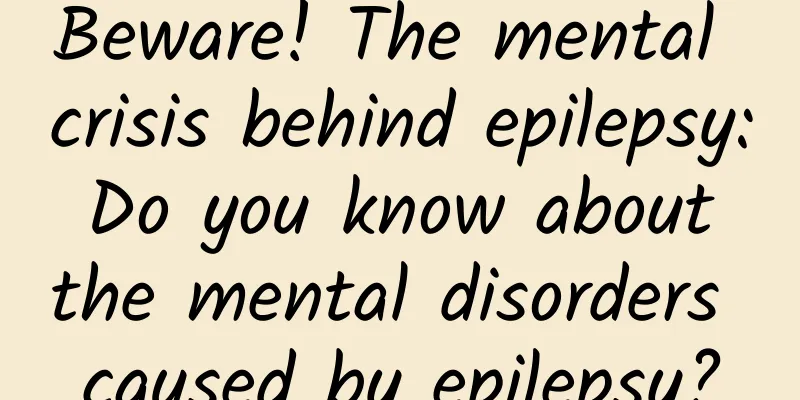Beware! The mental crisis behind epilepsy: Do you know about the mental disorders caused by epilepsy?

|
In daily life, we are familiar with epilepsy. The scenes of sudden collapse, limb convulsions, and foaming at the mouth are distressing. However, many people do not know that epilepsy can also cause mental disorders, bringing double pain to patients. Dr. Peng Fuzhi from the Department of Psychiatry of Physical Diseases at the Second People's Hospital of Hunan Province (Provincial Brain Hospital) recently received a patient who had epilepsy caused by trauma and subsequently developed mental and behavioral abnormalities. Next, Chief Physician Xiao Jianying took us to learn more about mental disorders caused by epilepsy. 1. Why does epilepsy cause mental disorders? Epilepsy is a chronic disease in which sudden abnormal discharges of brain neurons lead to transient brain dysfunction. The causes of mental disorders caused by epilepsy are relatively complex. 1. Changes in brain structure and function During an epileptic seizure, abnormal discharges of brain neurons affect the normal function of the brain. Long-term, repeated epileptic seizures may lead to structural changes in specific areas of the brain, such as atrophy of the hippocampus. The hippocampus is closely related to functions such as memory and emotional regulation, and damage to it may cause psychiatric symptoms such as memory loss, emotional instability, depression or anxiety. 2. Neurotransmitter imbalance Neurotransmitters in the brain, such as GABA, dopamine, and 5-HT, play a key role in maintaining a normal mental state. Epileptic seizures can disrupt the balance of these neurotransmitters. For example, GABA, as an inhibitory neurotransmitter, can cause abnormally increased brain excitability, leading to mental disorders. 3. Genetic factors Mutations or polymorphisms of certain genes may make patients susceptible to both epilepsy and mental disorders. Genetic factors play a role in the onset of both epilepsy and mental disorders, and people with a family history of the disease are at a relatively higher risk. 2. Actively prevent and reduce the risk of disease Although mental disorders caused by epilepsy are more difficult to deal with, there are some measures we can take to prevent them. 1. Prevent epileptic seizures This is a key link. Avoid head trauma and take protective measures when engaging in high-risk activities such as cycling and driving. Actively treat brain diseases such as intracranial infection and brain tumors, as these diseases are important causes of epilepsy. For people with a family history of epilepsy, genetic counseling and genetic testing should be performed for early intervention. 2. Regular treatment and life Once epilepsy is diagnosed, patients must strictly follow the doctor's instructions and take medication on time. They must not increase or decrease the dosage or stop taking medication without authorization to effectively control epileptic seizures. They should maintain a regular lifestyle, get enough sleep, avoid staying up late, and overwork. At the same time, they should avoid large mood swings and learn to self-regulate stress, because mental stimulation is also one of the triggers of epileptic seizures. 3. Scientific treatment to rekindle hope in life If you unfortunately develop mental disorders caused by epilepsy, timely and effective treatment is crucial. 1. Drug treatment Anti-epileptic drugs are the basis. Choose the appropriate drugs according to the type of epilepsy, control epileptic seizures, and reduce damage to the brain. For mental symptoms, antipsychotics, antidepressants, or anti-anxiety drugs can be used. However, these drugs need to be used with caution, taking into account the patient's age, physical condition, drug interactions and other factors, and should be used under the strict guidance of a doctor. 2. Psychotherapy Cognitive behavioral therapy can help patients recognize and change negative thinking patterns and behavioral habits, and cope with the psychological pressure caused by the disease. Supportive psychotherapy provides emotional support for patients, helping them better adapt to the disease and increase their confidence in recovery. 3. Surgical treatment For patients who are ineffective with drug treatment and have a clear epileptic lesion, surgical resection of the lesion may be an option. Surgery can reduce the number of epileptic seizures and thus relieve mental symptoms, but the risks and indications of surgery need to be strictly evaluated. Mental disorders caused by epilepsy are not invincible. By understanding the causes, taking proactive measures to prevent and treat them scientifically, we can help patients relieve their pain and improve their quality of life. I hope everyone can pay attention to this and care for patients with epilepsy so that they are no longer alone in their fight against the disease. Hunan Medical Chat Special Author: Peng Fuzhi, Male Ward, Department of Psychiatry, Department of Physical Diseases, Hunan Second People's Hospital (Provincial Brain Hospital) Follow @湖南医聊 to get more health science information! (Edited by YT) |
Recommend
What does it mean for a woman with a mole on her left ear?
People in our country still have a lot of faith i...
Pregnant women's clothing matching pictures in spring
After a woman becomes pregnant, her body will und...
What should I do if I drink tea water during my period?
Whether you can drink tea during menstruation dep...
How to treat fishy leucorrhea
Any condition that can cause congestion in the pe...
How to treat pelvic inflammatory disease during menstruation
Some women often suffer from gynecological diseas...
After pregnancy, it hurts to have sex
Many women do not actually know that they cannot ...
What causes breast tenderness after pregnancy?
Female friends should be more worried about the p...
Brushing your teeth correctly is more important than choosing the right toothpaste
Today (September 20) is the 33rd "National L...
Seven great ways to fight aging
It's no secret that exercise can keep the bod...
Which is better for laying full-body tiles, polished tiles, and glazed tiles in the living room? What kind of tiles are suitable for laying in the living room?
We all know that ceramic tiles are a common decor...
Arm pain after medication
After a medical abortion, you should pay attentio...
Where does pelvic pain hurt?
Many people do not have enough understanding of t...
Is it normal for the fetal movement to decrease in late pregnancy?
In life, many pregnant women will find that the a...
What are the advantages and disadvantages of autologous fat transplantation for breast augmentation?
Today, some girls go to beauty salons for plastic...
What are the practical rules for eating hot pot? What are the benefits of eating hot pot in winter?
In 2014, Chongqing hotpot became very popular on ...









